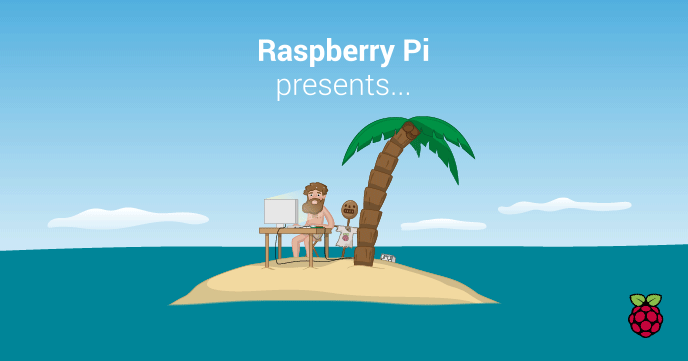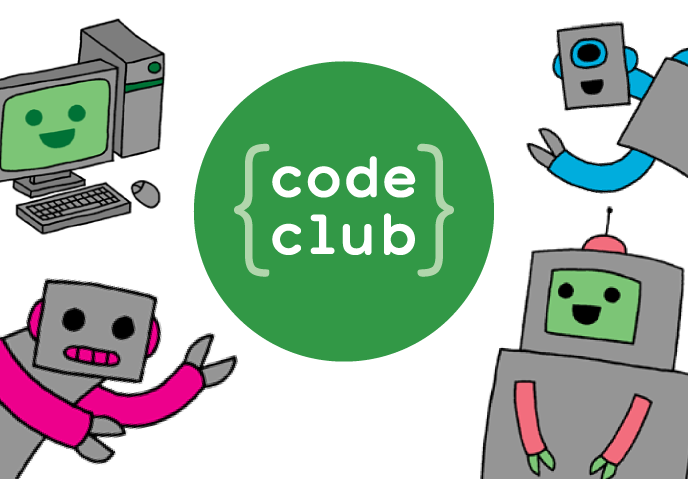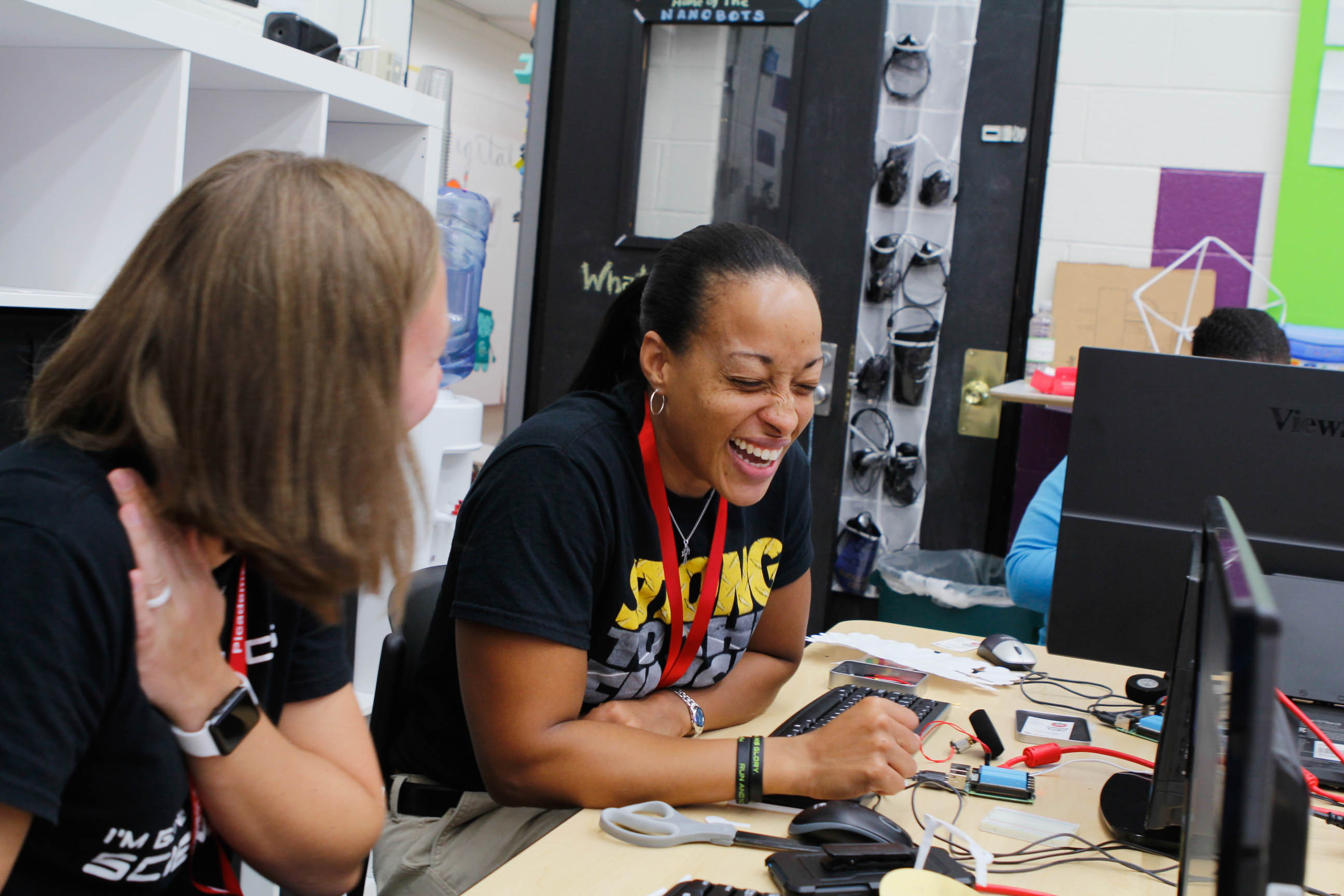Announcing our new online training series
At the end of this week, with our final Picademy of 2016 taking place in Texas, we will have trained over 540 educators in the US and the UK this year, something of which we’re immensely proud. Our free face-to-face training has proved hugely popular: on average, we receive three eligible applications for each available place! However, this model of delivery is not without its limitations: after seeing our Picademy attendees getting excited on Twitter, we often get questions like: “Why haven’t you run a Picademy near me yet? When are you coming to train us?”

We grew frustrated at having to tell people that we didn’t have plans to provide Picademy in their region in the foreseeable future, so we decided to find a way to reach educators around the world with a more accessible training format.
We’re delighted to announce a new way for people to learn about digital making from Raspberry Pi: two free online CPD training courses, available anywhere in the world. The courses will run alongside our face-to-face training offerings (Picademy, Skycademy, and Code Club Teacher Training), and are facilitated by FutureLearn, a leading platform for online educational training. This new free training supports our commitment to President Obama’s Computer Science For All initiative, and we’re particularly pleased to be able to announce it just as Computer Science Education Week is getting underway. Here’s the lowdown on what you can expect:
Course 1: Teaching Physical Computing with Raspberry Pi and Python

This four-week course will introduce you to physical computing, showing you how easy it is to create a system that responds to and controls the physical world, using computer programs running on the Raspberry Pi. You’ll apply your new-found knowledge to a series of challenges, including controlling an LED with Python, using a button press to control a circuit, and making a button and LED game.
If you’re a teacher, you’ll also have the chance to develop ideas for using Raspberry Pi and Python in your classroom, and to connect with a network of other educators.
Course 2: Teaching Programming in Primary Schools

This four-week course will provide a comprehensive introduction to programming, and is designed for primary or K-5 teachers who are not subject specialists. Over four weeks, we’ll introduce you to key programming concepts. You’ll have the chance to apply your understanding of them through projects, both unplugged and on a computer, using Scratch as the programming language. Discover common mistakes and pitfalls, and develop strategies to fix them.
Registration opens today, with the courses themselves starting mid-February 2017. We hope they will inspire a new army of enthusiastic makers around the world!





29 comments
Michael Horne
Brilliant. Online training courses for everyone. Great idea. :-)
Winkleink
Does the Scratch course require Raspberry Pi?
My kids school uses Scratch but until now their use of Raspberry Pi has been limited.
Raspberry Pi Staff James Robinson
Nope, any old computer that can run scratch is fine :-)
Lauren Hyams
To take part in Teaching Programming in Primary Schools you’ll need a computer and access to Scratch.
Homer L. Hazel
I know you are all about doing your own thing. But there is a very large organization that is also dedicated to learning, but not necessarily about Computers.
I just got an Email from Khan Academy discussing the Hour of Coding that they are offering. Minecraft is also offering the Hour of Coding, probably just for Minecraft, but that’s okay with me.
Have you considered allowing your Lessons and such to be used at Khan academy?
Raspberry Pi Staff Liz Upton
Of course – and they have been available for other people to use for years. You’ll notice that everything we do is CC licensed, so it’s available for anybody to use. The Hour of Code is a global event which many, many, many organisations take part in.
Jan Wilhelmsen
Thanks , I’ve been waiting for this.looking forward to attend these courses.
Elfen
Great and about time!
Julie Price
I have signed up already for both these courses run through FutureLearn.
Happily for me, I am becoming quite an ‘old hand’ at updating my own learning with this particular MOOC – which I alighted upon after much research into the ‘genre’.
I have nothing but praise for FutureLearn
Tom
I’ve been in IT for 42 years now and am looking to help teach programming and electronics at my daughters primary and also help develop CC coursework that teachers can use and develop. You say above that this is CC – is it possible to get hold of the coursework as I was hoping to start in Jan!
Raspberry Pi Staff Liz Upton
Check out the Creative Commons-licenced resources at https://www.raspberrypi.org/resources/; they should be more than enough to keep you busy creating a course until the new term starts!
Guhan Pari
i am from india i have in-trust to do coding in pi 3 can u help me with this
Bill Harvey
This is absolutely fantastic :-)
John Medeiros
Thank you for this opportunity. Is it possible to get Pi Certified by taking courses exclusively online? Or, will we still have to travel for some classes?
Raspberry Pi Staff Dan Fisher — post author
Hi John, you will have the opportunity to get a certificate on completion of the course, but it won’t award you the status of ‘Raspberry Pi Certified Educator’. That title is still reserved for educators who attend and successfully complete our face-to-face Picademy training.
Jim Manley
Sounds like just what Doctor Pi ordered! I am signed up for both courses and anxiously drumming my fingers on the keyboard waiting for it to be February 20th.
I hope all materials will be able to be hosted off-line, as many schools/classrooms don’t have enough bandwidth at random times, let alone as all of the classes start at the same times.
I also hope it has assessments built in which can also be administered locally off-line. A Khan Academey Lite like package would be very helpful, but with templates for extending and refining the material to allow for local needs.
This all needs to be in zipped files, not just on GitHub, which many schools/districts block due to a concern for Not Suitable For Schools (NSFS) warez, porn, and who-knows-what.
David
@Jim Manley, You can already one-click download a .zip on GitHub. I think you mean the .zip archive needs to be hosted on a site other than GitHub to begin with.
Jarle Teigland
Excellent initiative !!
David
Is the Python course Python-2 or 3?
Raspberry Pi Staff Dan Fisher — post author
Hi David,
As with all of our resources and educational content, we are using Python 3 (and would advise educators to do the same).
Steve Dyer
I am retired but have signed up for both Future Learn courses to stimulate my grandkids who are 7 and 9. My grandson is already involved in a Scratch club at his school so I hope to be able to keep up with him and provide some challenges that we can both learn from.
Keep up the great work. Cheers from Canada.
ThreeDogs
10.12.2016
Hello,
I have a very small club with people aged from 14.
Would course #1 be suitable for us?.
After they looked at the language Scratch it found no appoval. So Python and C would be ideal.
3D in Germany
Howard
Hi, these courses are great but most of the schools I work with do not have access to the internet. Instead we use the Pi as a RACHEL(Rural Area Community Hotspot for Education and Learning) and Khan Academy server. Would it be possible for you clever folks to provide an offline version of these courses?
Ismaël
Hi,
Great idea!
As I’m not english native, but french, do we get a chance to have french language support ?
Thanks for your help.
Ismaël
Nigel
OK….A good idea.
But I would like to see a much more advanced course.
Programming in C,C++ and Python, looking into Jessie.
Interupts and for a real challange OpenCV and/or Open Frameworks….
Just an Idea.
I think the maker + hobbyists are more in number than the Pupils.
Peter
The foundation’s goal is to educate kids. So although you might be correct that there are more hobbyists and makers using Pi’s, that is not really part of the mandate.
Andy Coblentz
I’ve almost finished taking FutureLearn’s Physical Computing with Raspberry Pi class. I’m interested in expanding on what I’ve learned in this class. What opportunities for online learning are there this summer?
Rebecca
I like the idea of the course sadly we dont get a certificate unless we pay £69 which i dont think is fair.
Michael
Where do I ourchase a Rasbeery pi 3 ? I am working with students using the starter kits. I am a sub teacher wanting to learn rasberry and teach it too. I have an Electronic Engineer Degree. I noticed so many kits using google search including Walmart, and some electronic places. Whuch kits are IStem schools using? Where can I purchase the starter kits and what do you recommend? Thank you